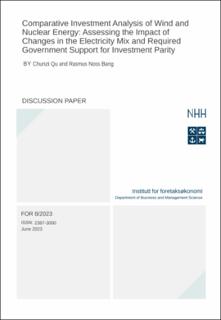| dc.description.abstract | Nuclear energy is once again in the spotlight in Europe, due to recent technological advancements and geopolitical challenges. Our study presents an investment analysis framework that compares the prospects of onshore and offshore wind projects, as well as traditional and modular nuclear projects. We evaluate the investment potential of each option, both with and without government financial support, similar to the system in place in France. Our study also includes an investment parity analysis, which determines the level of government financial support required to make modular nuclear power plants as attractive as wind projects under various circumstances. Our results show that, without government support, onshore wind projects are the most attractive investment option, followed by offshore wind projects. However, in certain circumstances and based on specific metrics, modular nuclear projects can be more appealing. Interestingly, our findings indicate that with French government support, offshore wind projects offer better investment prospects than onshore wind projects. To achieve investment parity with the most attractive wind project, modular nuclear power plants, which have a relevant advantage in terms of shorter construction times than wind projects, would require a feed-in premium similar to that offered to offshore wind projects. | en_US |
